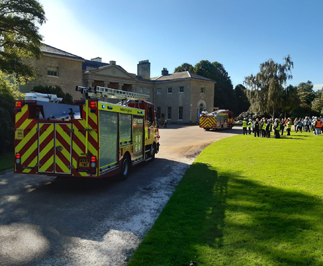If heritage venues do not have the correct salvage plans in place, historic venues could lose precious items, London Fire Brigade has warned. LFB joined English Heritage recently for a training exercise at the historic building Kenwood House in Hampstead, north London (pictured) which houses an art collection. The Brigade has a dedicated Heritage team, who regularly work with cultural and historic venues, and carry out drills to rehearse response to a fire or flood.
The exercise at Kenwood House – a mock fire – saw English Heritage staff inform fire crews where items were and how they should be handled. Such rescues are only possible when venues have up to date emergency response and salvage plans, the Brigade points out.
A salvage plan identifies not only actions by on-site representatives, but identifies priority items to remove from a building, or protect in place. Fire crews can put recovery strategies in place in advance. Plans help firefighters decide what equipment is needed to safely recover or protect items swiftly, and minimise damage. Salvage plans should include ‘Grab Sheets’ which detail the size of an item, the number of people required to lift it and location – to help firefighters save time in a fire or flood.
Every museum, gallery and historic building should have a nominated person responsible for the salvage plan, making sure that a plan exists and is kept up to date, says LFB. A member of the Brigade’s Heritage Team can provide advice on salvage planning.
An estimated 20,000 listed buildings are in London, including many national landmarks, attractions and historic properties. LFB reports that it attended 1285 fires at or near heritage sites in the last four years; and 50 fires at cultural venues such as a museum or art gallery. Nationally there’s an average of around 100 fires at heritage sites a month.
London Fire Brigade’s Heritage Team Leader William Knatchbull said: “With so many heritage sites in the capital part of our role is to preserve them for the next generation.
“We can’t preserve these beautiful and iconic landmarks without the venues themselves working with us to have emergency salvage plans in place. All building managers need to be aware how important it is to have a plan should the worst-case scenario ever occur. We welcome those people getting in touch with our dedicated team so we can ensure that the plans are appropriate both for the location and our crews, should they ever get a 999 call to attend an incident.”
And Abi Marsh, Head of Historic Properties English Heritage London, said: “Keeping our guests, staff, historic collection and buildings safe is our number one priority, we not only have incredibly stringent preventative fire protection measures in place but also understand the importance of our staff being prepared through training such as this week’s exercise with the London Fire Brigade. We are very grateful to all the team at the London Fire Brigade for their continued work supporting us in caring for our historic spaces.”
After the fire destroyed the roof at Notre Dame Cathedral in Paris in 2019, the Brigade wrote to 350 venue owners across London, urging them to consider emergency response planning. The Brigade also launched dedicated web pages of heritage-specific fire safety advice.
Case study
In May 2020, firefighters were called to flooding at the Lyceum theatre in the West End. Fire crews attended in the evening and worked to pump water away. Delicate flooring meant the crews had to adapt the equipment they used to get rid of water without damaging the building.









